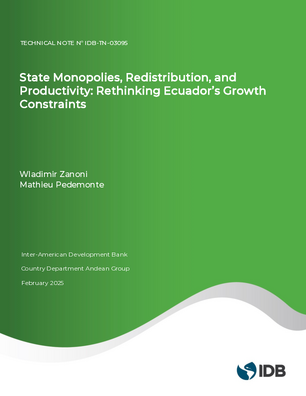State Monopolies, Redistribution, and Productivity: Rethinking Ecuador’s Growth Constraints
Date issued
Feb 2025
Subject
Small Business;
Economic Development;
Petroleum;
Productivity;
Industry;
High-Productivity;
Sustainable Growth;
Debtor Finance
JEL code
O43 - Institutions and Growth;
O54 - Latin America • Caribbean;
H11 - Structure, Scope, and Performance of Government;
H21 - Efficiency • Optimal Taxation;
L32 - Public Enterprises • Public-Private Enterprises
Country
Ecuador;
Ecuador
Category
Technical Notes
Ecuador's economic performance has lagged behind its potential and the broader Latin American region since 2010. Despite rising public debt and financial support from international institutions, Ecuador's economic growth remains stagnant. This paper seeks to characterize the key structural factors impeding Ecuador's economic growth and identify policies that could enhance it. We develop an analytical model framed within the Melitz (2003) framework to examine the implications of a state-controlled monopoly over extractive export-driven industries and the redistributive mechanisms that sustain low-productivity firms. Our findings indicate that redistribution policies sustain inefficient firms, hinder productivity growth, and entrench political incentives that perpetuate economic stagnation. This study contributes to the broader literature on state-owned monopolies and economic growth by illustrating the specific challenges faced by Ecuador and offering insights into policy reforms necessary to break the cycle of stagnation.
NO



